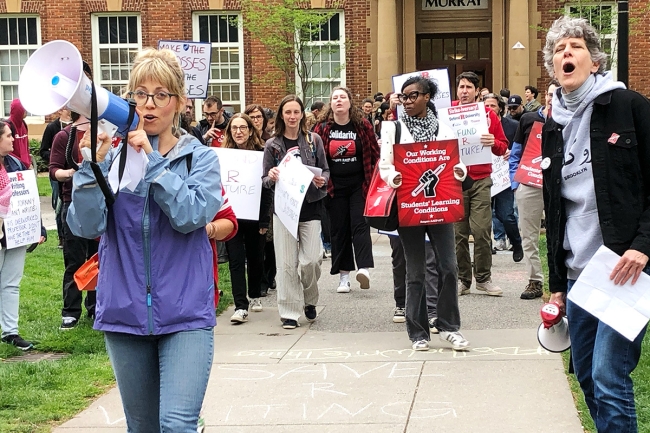You have /5 articles left.
Sign up for a free account or log in.

Rutgers University unions celebrated their “Strike-iversary” during the national Day of Action for Higher Education Wednesday, about a year after they staged a weeklong strike.
Alan Maass, Rutgers AAUP-AFT
Howie Swerdloff has been a Rutgers University at New Brunswick lecturer for 14 years. A week ago, he said, while driving from a faculty meeting on the fall curriculum to teach a class, a text message appeared on his car’s console telling him to read his email. He pulled off to the side of the road, read it and was shocked.
Swerdloff learned he likely won’t be around to teach that fall curriculum. And he wasn’t alone: he said at least a score of other lecturers in the Rutgers Writing Program, which teaches writing to undergraduate students across the New Brunswick campus, are not being reappointed to teach. More than 100 classes are being cut and the maximum class sizes for the remaining instructors are increasing from 22 to 24, he said. A Rutgers spokesperson would not confirm or deny this Wednesday.
“There’s no educational justification for this,” Swerdloff said, adding that increasing class sizes “goes against all evidence of how to teach writing.” The program is “like a cultural icon,” he said, an “institution” of over 30 years, and cutting it is “shocking to people.” He said he worries about Rutgers taking away his email account that students use to reach him—sometimes to get a job reference from the only teacher they got to know well enough to request one. It’ll be like “I never existed here,” he said. “That’s really painful to think about.”
But Swerdloff, secretary of Rutgers’ adjunct union, isn’t taking the cuts lying down. Nor were other faculty members during Wednesday’s national Day of Action for Higher Education, which featured teach-ins, petitions, rallies and at least one new strike. According to Irene Mulvey—president of the American Association of University Professors (AAUP), which had numerous local chapters take part in the day—events took place on more than 100 campuses.
Local AAUP chapters and other higher education unions organized the events, which weren’t just about opposing program cuts or layoffs. The day was an attempt to spark a movement of students, faculty members and unions to push back against what the AAUP and other groups consider coordinated attacks from politicians and others on quality, “democratic” higher education. These include cuts to academic programs, restrictions on academic freedom, decreases in faculty job security, curtailments of diversity, equity and inclusion programs, and more.
The planned events were varied: a virtual teach-in on DEI at the University of Florida, a teach-in about the conservative Heritage Foundation’s DEI opposition put on by the United Academics of Oregon State University and, at the University of Nebraska at Lincoln, a raffle of books that have been targeted for censorship.
Organizers said it was only coincidental that the Day of Action took place on the same day Columbia University’s president publicly testified before a U.S. House committee—a hearing reminiscent of the December one that contributed to the fall of two other Ivy League presidents.
It’s too early to gauge the turnout, much less the effectiveness, of the Day of Action events. Organizers in the Northeast suggested that rain may have dampened turnout for the demonstrations. At a rainy and cold Rutgers New Brunswick, Swerdloff said a pro-Palestinian student rally was taking place at the same time and location as the Day of Action event, causing some issues and making it unclear how many people were there for which rally. A Rutgers AAUP-AFT (American Federation of Teachers) union spokesman said dwindling numbers caused organizers to call off the original plan to deliver a petition to administrative offices protesting the Writing Program cuts.
A Rutgers spokesperson, in an emailed statement, said that Writing Program curriculum changes necessitated fewer class sections, and more “will be added if necessary to meet student demand.” Currently, “sections are significantly under-enrolled, and each year numerous seats remain vacant in courses in other departments that meet the same core curriculum requirements,” the university said.
Swerdloff said the three Rutgers unions that simultaneously struck for a week, starting April 10, 2023, moved their “Strike-iversary” to Wednesday for the Day of Action.
And the same day of this “Strike-iversary” in New Jersey, a new strike kicked off in the Midwest.
Indiana, Penn Get in on the Action
Following Indiana University at Bloomington faculty members’ lopsided no-confidence votes in their president, provost and a vice provost Tuesday, the Indiana Graduate Workers Coalition carried through on its previous strike threat Wednesday morning.
Sam Smucker, an IU doctoral student who’s on the union’s coordinating committee, said the strike’s beginning landed by “happy coincidence” on the Day of Action—and at a moment when other unions, including the Boston University Graduate Workers Union, are on strike. “We certainly see our struggle here as part of that broader struggle,” he said. “This is really about the imbalancing of power inside the academy in general.” He added that “we have to stand up now before it’s too late—we’re seeing the deterioration of academic freedom all across the country.”
The IU strike is focused on the fact that the university hasn’t yet recognized the union as the official representative of the grad workers, meaning there’s no official collective bargaining between the two sides. Indiana law doesn’t require that public universities recognize unions. This lack of recognition is among the reasons faculty members cited for supporting the no-confidence votes.
The union went on strike for four weeks back in 2022. “The strike two years ago resulted in big wage increases,” Smucker said, but the university has still “never met with or even emailed the union.” He said the union is fighting for better pay and benefits, a grievance procedure and other advances, but he said the fundamental issue is getting a “seat at the table.”
The current strike is set to end after Friday, but Smucker said “this is part of a long-term plan to strike fairly periodically going forward. Our first strike was a long, intense strike and the university was not moved,” at least beyond the wage hikes. He said the union believes it will have to strike “over and over and over,” possibly for years, until the university will “sit down and talk with its employees.”
An IU spokesman said in an email Wednesday that its Board of Trustees “made it very clear that efforts to enhance graduate education at IU are best accomplished through existing channels of shared governance and collaboration.” He added that “with multiple raises announced in the last two years,” IU Bloomington has increased student academic appointees’ minimum stipends more than 50 percent, “in addition to eliminating mandatory graduate student and course-specific fees.”
Another union was fighting for recognition on the Day of Action: Graduate Employees Together at the University of Pennsylvania, or GET-UP. It rallied with the support of already-recognized Penn unions Wednesday.
Brendan Mahoney, a GET-UP organizer and a Ph.D. candidate, said the campaign to organize Penn grad workers has been ongoing for twenty years. Wednesday’s rally protested past delays in having a union recognition election, which is currently set for May 1–2. In an email Wednesday, a Penn spokesperson wrote that “Penn’s graduate and professional students will have the opportunity to vote on whether they wish to be represented by the UAW in an election,” and that the election will indeed be held May 1–2.
“We feel good about this election, we feel really good,” Mahoney said. “I think that it’s exactly this kind of workplace democracy” the Day of Action was meant to highlight, he said.



